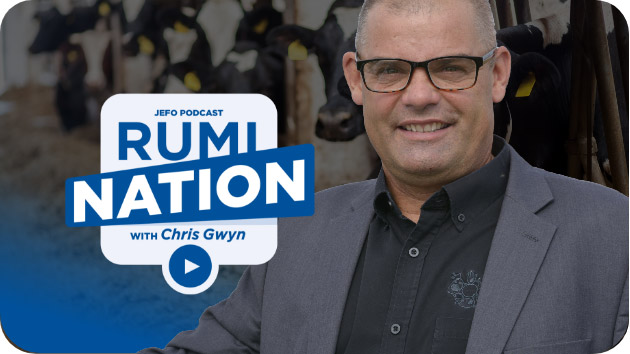RumiNation | S05 : E07
Solutions for Navigating the Current Economy
Brought to you by Jefo Nutrition
Share now!
Did you enjoy this episode?
Share now!
Our guest - John Ellsworth
Founder of Success Strategies, John Ellsworth is a Finance and Strategy Consultant. He holds a Master of Business Administration from Duke University’s Fuqua School of Business and a Bachelor’s Degree in Dairy Science from The University of Georgia.

Timestamps & Summary
Chris Gwyn (02:09)
So, John, in your work advising agricultural businesses, and perhaps dairies in particular, talk to us about the strain that the current financial stressors of higher interest rates, softening milk prices, and continuing high commodity prices cause at the farm level.
John Ellsworth
I think with inflation that we’re fighting, not just in the US but Canada, everywhere, we have just higher-level inflation than we’ve seen for probably 40 years. And for our younger listeners, they probably never even experienced this before. And so, I was fairly young the last time we had this kind of event with inflation. But costs, the pressure on costs are crazy high and unfortunately, it’s being compounded by, I think, out-of-control spending, at least in the US. […]
Chris Gwyn (04:57)
Talk to me about the practices that you’re advising your clients and general producers to put in place to minimize that financial strain and that stress that it’s going to cause.
John Ellsworth
I have really felt in the good times and the bad times, number one, that people need to know their costs. The reality is every operation needs to know what it costs them to produce. If it’s dairy, for example, what is your cost to produce 100 pounds of milk? What are the break-even levels? If we measure something, we can understand it and we understand it, we can control it. If we can control it, we can make improvements in that area. […]
Chris Gwyn (07:34)
Is there anything unique with the current strain or stress that producers need to consider or is it just a matter of if you haven’t done it now really is the time to get it done?
John Ellsworth
I think what’s happening is a decrease in revenue on the revenue side, particularly milk specifically, and the cost side is happening. I mean, it happens in every downturn, but this has happened a lot faster. […] It’s happened at a more rapid pace, which makes it more difficult, more challenging for people, I think. So the speed at which it’s happening is pretty daunting, I guess is a good word for it.
Chris Gwyn (08:46)
In the past, you’ve written and you’ve spoken a lot about putting in place a business system that will help to manage financial strain, and I’m wondering if you could expand upon that point and what it is.
John Ellsworth
I think it’s a good time to use not just financial advisors but all your advisors very closely. […] I think it’s time to use your advisors wisely and maintain focus. […] It’s important to follow the advice of your advisors, your legal advice, your accountants, financial advisors such as myself, and your nutritionists. I think we have to look for ways to not just cut costs because we never want to cut costs to the point of hurting the performance of your dairy herd, for example. But I think we’ve got to turn over every stone that’s out there, everyone that’s available to us. […]
Chris Gwyn (14:48)
What would you leave with producers and their advisors, some of the key take-home messages key points that you would recommend that they implement or work on today in order to get to the next really positive milk price?
John Ellsworth
I think you always want to focus on the goal, and the goal is to become more profitable, of course, in a difficult time like this. But remember that ignoring the problems doesn’t make them go away. And especially on the financial side when you’re dealing with bankers […] you got to plan in the good times to overcome times like this. […] So, on the feed side, for example, we try to prepare by having better contracts. That’s not always possible, but one of the things I advise people, now, we’re seeing feed costs come down. So, should I run out and contract everything? Not necessarily. […] I think it’s important to think about laying in tiers. So, if corn is going from $300 a ton to maybe it ends up to 240 or something a ton lay in those tiers. So, if it bounces back up, you’ve got some locked at the decrease in cost, but you’re not trapped with all of it at 275 when it gets to 230. […]
I would end with this, this too shall come to pass. This is a difficult time we’re going through. The bankers know it, the producers know it, and we all understand it. But I suggested to some clients recently that they should talk to their vendors, but also talk to their bankers because it’s not an unreasonable request in my mind if you have a $400,000 line of credit for feed in a time like this, you may need to increase it to $500,000 or something of that nature. Not an unreasonable amount, even if it’s a temporary increase for 6 months or 12 months, and then go back to the more normal level, I think people overlook that.







